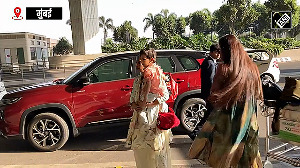The debate and discussions in India over the civilian nuclear deal will have to play its own course and this process should take place without the involvement of third parties, especially the United States, a senior American official said in Washington on Thursday
Emphasising that the India-US nuclear agreement is in the interest of both the countries, Richard Boucher, the top official in charge of South and Central Asia, hoped that "they will go through this (debate) and continue towards implementation".
In his opening remarks, Boucher said that the US sees in India a "natural partner in almost every area."
"The US-India relationship is led by people. The governments are still in the process of catching up. The people-to-people relationship is what is going to make the difference," the senior official said.
"The debate in Indian Parliament and between the Indian political parties is one that probably best proceeds without the involvement of outsiders and without comment from the American assistant secretary of state," he said in an interactive session at the Paul Nitze School of Advanced International Studies of the Johns Hopkins University.
"The deal is a deal. We have been very public and transparent about how this was done and the understandings that have been reached. They are going to have to work this out in the politics of India. We will see how this plays out."
Boucher admitted that there are a few more "hurdles down the road" and a key one is India's negotiations with the International Atomic Energy Agency on a safeguards agreement.
"But it is important to remember that India already has safeguard agreements with the IAEA on a number of its civilian nuclear facilities. So we don't think that it is an enormously difficult negotiation for them," he maintained.
The senior official said a lot of "good work" has been done on both sides to finalise the agreement and that the deal has been carefully negotiated to meet the needs of both the countries.
"We got a good agreement for both of us," Boucher said, reminding the audience that in a democracy like India there is bound to be debate and discussion.
"Just as we have gone through our debate and discussion in our Congress and will have to do some more, they have to do in their Parliament as well...They are going to have to go through that. We have come a long way because fundamentally this is a good deal," the official said.
"We have to believe, and I predict that they will go through this and continue towards implementation," concluded Boucher.






 © 2025
© 2025